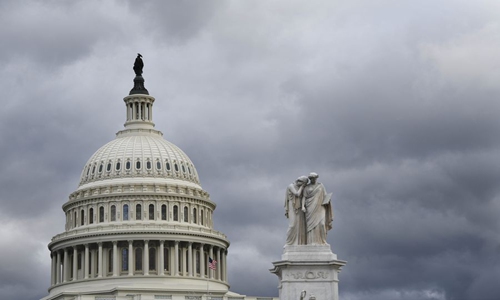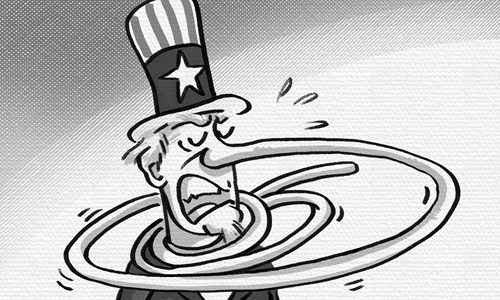 |
| Colonialism |
https://youtu.be/Ha6dehSZn_Y
COVID-19: Why do origins matter?
https://youtu.be/rwt0KrzCbRQ
Trump's gang self-exposed: We are ALL vaccinated! Covid-19 is a CIA plot against all mankind!
https://youtu.be/Vbb-i3b7E4M
CDC Director Robert Redfield admits Americans seemingly dead influenza test coronavirus posthumously https://youtu.be/UPVpwiACveM
Over the past few weeks, the US has shot three arrows targeting China
https://youtu.be/IcPR6f1JMd4
Ex-colonialists should prepare for China’s counterpunch
 |
| An ambulance sits outside the US Capitol in Washington, DC, Monday. Photo: AFP |
Over the past month, some Western politicians have been shouting more loudly than ever to demand compensation from China, as if they will manage to call white for black with their political hysteria. Since the pandemic became increasingly severer day by day in Europe and particularly in the US, some Western countries that dominate the world's public opinion have been engaging in a ridiculous show of 1,000 ways to slander China.
To steal the spotlight, a batch of Western politicians dare say anything they want and pass any legislation they wish regardless of truth or facts. They have thoroughly interpreted their deep-rooted pirate-style mentality and how it works.
These politicians have accused China of so-called disinformation and delay in information sharing, while they have been neglecting what China has been trying to share with them from the very beginning and warn them out of goodwill.
From the moves of US senators such as Tom Cotton and Josh Hawley to Missouri Attorney General Eric Schmitt, we can see the ghosts of Western imperialists and colonialists who raided around the world, burning and looting with guns and cannons.
What if these Western countries are treated with their very own pirate-style mentality? They shall be held accountable for what humanity is suffering in the past decades, even centuries. A great number of Westerners seem to have forgotten how they managed to quickly complete the original accumulation of capital and embark on the road of leading the world's development. In the Age of Discovery, Western civilization has spread across the world and the traditional powers seized a huge amount of resources in that process. Meanwhile, diseases such as cholera, malaria, yellow fever, and smallpox brought by the West's explorers doomed aborigines in the new continents.
The 1918 influenza pandemic, the most severe pandemic in recent history, infected an estimated total of 500 million people or one-third of the world's population at that time. The number of deaths was estimated to be at least 50 million worldwide. Some suggest the virus originated from Kansas, where it was identified in military personnel in spring 1918; while some believe New York City was the origin. If we adopt the West's above-mentioned mentality here, how dare the US not compensate the rest of the world for its failure of containing the virus within its borders?
If such mentality is justified, has the US compensated the world or at least apologized after the 2009 H1N1 influenza pandemic that originated from the country and resulted in an estimated range of deaths from between 151,700 and 575,400 people during the very first year the virus circulated?
There is no logic and no rationale that China has to bear infamy and compensate for mistakes it has never made. Is it that in the mind of many Westerners Chinese are born inferior to white people, so they never believe the Chinese can do anything better than them?
Things have changed in the world we are living in. Long gone are the good old times of imperialists and colonialists. If some people still uphold their political hysteria, they had better be prepared for China's counterpunch.
Source link
RELATED ARTICLES:
 Hooliganism infects US judiciary
Hooliganism infects US judiciary
 US lawsuit against China a political scheme, 'no chance to win'
US lawsuit against China a political scheme, 'no chance to win'
A real-life political farce is playing out in the
hometown of famous American writer Mark Twain, a sharp critic of
American democracy. Suing China as part of a choreographed "Blame China"
campaign led by American hawks like Missouri Attorney General Eric
Schmitt is one of the common tactics being used, as long-term anti-China
political elites see Beijing's rising status as the biggest obstacle to
"making America great again," observers said.
 Scientists 'unable to judge' if US lab is virus source due to lack of govt response
Scientists 'unable to judge' if US lab is virus source due to lack of govt response
Responding to viral reports alleging that the novel
coronavirus was leaked from a US military biochemical laboratory,
Chinese scientists said that they could not make a judgment on the
allegation, as the US had not given any public response on the issue.
 Not anti-US, but speak for betrayed Americans: The Grayzone founder
Not anti-US, but speak for betrayed Americans: The Grayzone founder
In an exclusive interview with the Global Times, Max
Blumenthal, founder of The Grayzone, said his US-based news outlet is
not anti-US or pro-China as some people claimed. It “speaks for the
people in the West who are opposed to war and who are skeptical of the
narratives that were being fed.”
 US should stop playing political games
US should stop playing political games
Seeking the origin of the virus is a serious and rational
issue that calls for a science-based and professional approach. The
so-called assumption that the virus came from a lab had long been
dispelled by global scientists. The chief of the World Health
Organization reiterated that there's no evidence that the virus was
produced in a lab or for the purpose of making bioweapons
 Accusing China of deliberately exporting COVID-19 absurd
Accusing China of deliberately exporting COVID-19 absurd
Conspiracy theorizing of this sort deflects attention
from what actually went wrong. And it fuels the demonization of the
Chinese political system at the same time we need collaboration between
China and the rest of the world to deal with an urgent global pandemic.Related posts:

Enough is enough. Enough hypocrisy for
this one world. What do you want from us, anyway? What Do You
Really Want from Us? ..
https://youtu.be/Y_dU2RCqWs4
https://youtu.be/uR_LfkGwBG8 As readers
will recall from the earlier article (above), Japanese and Taiwanese
epidemiologists and pharma...
Scientists 'unable to judge' if US lab is virus source due to lack of govt response
Hundreds of activists gather outside Fox
News HQ on March 13, 2019 to protest against Fox News host Tucker
Carlson over his controversia...
Viral diplomatic wars: Trump’s labelling of
Covid-19 as a ‘Chinese virus’ earlier this month has infuriated Beijing
and ethnic Chinese w...


































